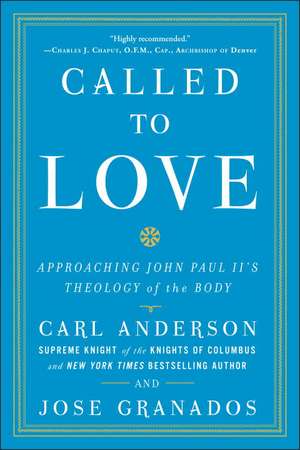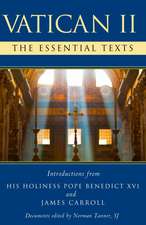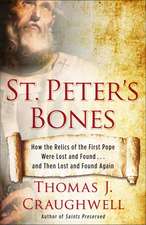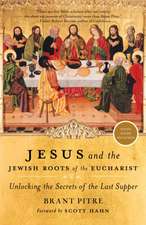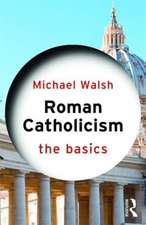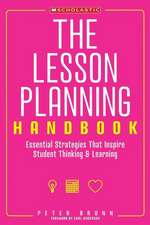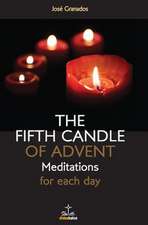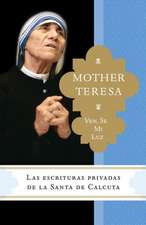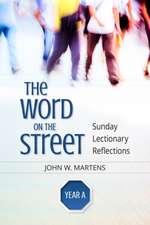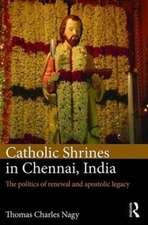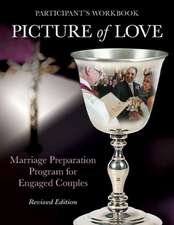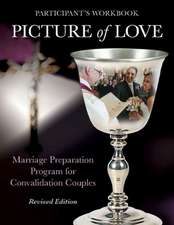Called to Love: Approaching John Paul II's Theology of the Body
Autor Carl Anderson, Jose Granadosen Limba Engleză Paperback – 30 iun 2012
Christianity has long been regarded as viewing the body as a threat to a person's spiritual nature and of denying its sexual dimension. In 1979, Pope John Paul II departed from this traditional dichotomy and offered an integrated vision of the human body and soul. In a series of talks that came to be known as “the theology of the body,” he explained the divine meaning of human sexuality and why the body provides answers to fundamental questions about our lives.
In Called to Love, Carl Anderson, chairman of the world’s largest catholic service organization, and Fr. Jose Granados discuss the philosophical and religious significance of “the theology of the body” in language at once poetic and profound. As they explain, the body speaks of God, it reveals His goodness, and it also speaks of men and women and their vocation to love. Called to Love brings to life the tremendous gift John Paul II bestowed on humanity and gives readers a new understanding of the Christian way of love and how to embrace it fully in their lives.
Preț: 95.29 lei
Nou
Puncte Express: 143
Preț estimativ în valută:
18.24€ • 18.97$ • 15.05£
18.24€ • 18.97$ • 15.05£
Carte disponibilă
Livrare economică 24 martie-07 aprilie
Preluare comenzi: 021 569.72.76
Specificații
ISBN-13: 9780770435745
ISBN-10: 0770435742
Pagini: 260
Dimensiuni: 132 x 203 x 15 mm
Greutate: 0.2 kg
Editura: IMAGE
ISBN-10: 0770435742
Pagini: 260
Dimensiuni: 132 x 203 x 15 mm
Greutate: 0.2 kg
Editura: IMAGE
Notă biografică
CARL ANDERSON, New York Times bestselling author, is the chief executive officer and chairman of the board of the Knights of Columbus. He held various positions of the Executive Office of the President from 1983 to 1987, was a member of the U.S. Commission on Civil Rights, and has taught at the Pontifical Institute for Studies on Marriage and Family in Rome. FR. JOSE GRANADOS is assistant professor of patrology and sytematic theology at the Pontifical John Paul II Institute for Studies on Marriage and Family at the Catholic University of America in Washington, D.C.
Extras
Chapter I
The Body Manifests the Person
WE BEGAN OUR JOURNEY OF REFLECTION IN THIS BOOK with John Paul II's identification of the key difference between man and the rest of the visible creation: "The rushing stream cannot wonder... but man can wonder!" (RT, 8). This wonder, we went on to see, is called forth by the richness of our experience of life-especially by the experience of love. Our task now is to ponder the indispensable role the body plays in this many-faceted experience of wonder.
Experience and Meaning
We all face the temptation to let life's current carry us along-to "go with the flow" without any resistance. But if we simply let a flood of experiences wash over us, we are in danger of losing the meaning of our lives. A recent survey of teenagers in Southampton, United Kingdom, revealed that this danger is anything but purely theoretical. The respondents, it turned out, possessed only a limited vocabulary to express the emotional quality of their response to the world. These teens suffered from what has been called "affective illiteracy": the inability to grasp and express the meaning of the experiences generated in us by our encounter with the world around us.
It isn't enough, then, simply to let our experiences wash over us. We need to plumb their depth. This exploration isn't a matter of "sampling" as many possibilities as we can, or of ratcheting up the volume of our existence, but requires us to ask ourselves questions such as these: Are we capable of distinguishing between experiences that build up our happiness and experiences that tear it down? Are we able to discern in our experiences something like a compass for our life's journey? In a word: Are we capable of perceiving the meaning of our experiences?
We tend to put experience and meaning in separate boxes. We have already seen why this won't work. When man experiences the world, he necessarily experiences himself in the process. For the same reason, man's experience of the world always involves an at least minimal search for the meaning of his life. The sight of a majestic mountainscape doesn't just reveal the wonder of creation; it also affords us an opportunity to lay hold of our innate capacity for beauty and wonder. Since the question of man emerges from our contact with the world, experience always goes together with a search for meaning. Even the refusal to embark on this search is an answer to the question of meaning.
We had the experience, we missed the meaning
And approach to the meaning restores the experience
In a different form.
These lines from T. S. Eliot's poem "The Dry Salvages" underscore the point that meaning is not foreign to experience. Quite the contrary, meaning is an integral part of experience. So much so, in fact, that meaning makes our experience properly human in the first place. John Paul II's insight into this unity of meaning and experience guided his reflection on the theology of the body, which begins with an effort to recollect the authentic "feel" of man's experience in light of its deepest meaning. In a word, the pope guides us through the labyrinth of our lives using the golden thread of what he calls "original experiences." So what is an "original experience"?
The Original Experience
John Paul II invites us to seek the true depth of our experience. Actually, it is Christ himself who first entrusted this task to us. When the Pharisees asked him, "Is it lawful to divorce one's wife for any cause?" (Matt. 19:3), he didn't list minimum sufficient grounds for divorce, but went instead to the heart of the matter: Is it really possible to love another person forever? The Pharisees clearly assumed that the answer was no. This assumption reflects their (and our) hardness of heart, and it speaks volumes about man's alienation from the root of his experience of love.
Christ came to retrieve and fulfill this root of love, and he therefore replies to the Pharisees by telling them to reread the creation accounts in the book of Genesis. He thus invites his questioners to recover the depth of their experience in the mirror of God's original intention for human love. John Paul II takes Christ at his word. As we know, Genesis presents two different accounts of creation, and John Paul II devotes considerable attention to both. Let's start with his reflections on the first narrative (Gen. 1:1-2:3), which lights up the true shape of our experience of everyday life in the blaze of God's Word.
The biblical text unfurls the rich tapestry of creation with all of its color and variety. It places man at the summit of the whole created world and underscores his special privilege of being made in the image and likeness of God. The words "image and likeness" signal the overture to the covenant between God and man in the Bible. They tell us that from the beginning man is the one to whom God addresses his Word and whose special status lies in his capacity to answer this divine call.
The Bible's affirmation of man's dignity as the "image and likeness of God," which comes at the end of the first creation account, calls for further commentary, because it still leaves open how man is meant to respond to the Creator. Answering this question is the job that falls to the second creation story (Gen. 2:4-3:24), which can thus be seen as the natural continuation of the first. After we've listened to the creative voice of God in the first account, we perceive man's answering voice in the second. The second creation narrative enables us to rediscover the inner experience through which we are to respond to the Creator's call.
In other words, the second creation account shifts the point of view of the story: Now it's man who speaks and reveals his interior world. This account doesn't just observe man from the outside; it presents the human journey of wonderment from man's own point of view. By putting us in man's shoes as he was in the beginning, the second creation account unfolds the "original experiences" we spoke of just now. John Paul II sums up these experiences under the three headings of "original solitude," "original unity," and "original nakedness."
Before going on to describe these original experiences, though, we should stop to ask ourselves whether we really can describe them, or even have any access to them at all. How can anyone retrieve events that supposedly took place at the very dawn of history? Even if we could do so, we would still face a further difficulty: Aren't the original experiences John Paul II describes permeated by a purity and innocence sin has extinguished in our hearts? How can experiences belonging to a sunken past help us attain happiness here and now?
Fortunately, man's original experiences of the beginning have in fact never been totally lost. Two images help illustrate the abiding presence of the beginning in the midst of our everyday reality.
The first image comes from J. R. R. Tolkien's The Silmarillion, which opens with a "creation myth" that compares God's creative design to a piece of music. As Tolkien goes on to relate, Melkor, the dark angel, becomes jealous of God's creative power and tries to introduce a discordant note of his own into the celestial orchestra. Yet, as God reminds Melkor, even this disharmony cannot destroy the pattern of the original music. On the contrary, even Melkor's rebellion will be woven (against his intention) into the final master theme all creation will sing to God's glory.
Similarly, we can compare the three original experiences John Paul II refers to with a primordial music that, while distorted through sin, has never completely been destroyed by it. If we listen inattentively, we will hear only noise. If, however, we keep silent and turn our ear to the hidden pattern beneath the noise, we can still discern the original melody that reflects the Creator's wise design. Actually, it's only because the original harmony still resonates in the background that we can hear the dissonance as the disruption it is.
Another way of putting this is that the original experiences are not "original" only in the sense that they happened at the beginning of human history. We call the original experiences "original" because they lie at the basis of every other experience and provide the theme for every other music we compose with our lives. Our use of "original," then, has the same double meaning as the Greek word archŽ, which signifies both a temporal beginning and the foundations of a building. This leads us to the second image that illustrates the continuing accessibility of man's original experiences.
As the facade of Saint Peter's Basilica was being cleaned recently in preparation for the Jubilee of the year 2000, the workers were surprised by the green color of the marble surrounding the central windows. Some even thought that the chemical agents used to clean the building were destroying the marble's original color. Consultation of the original plans for the basilica, however, brought to light that this green was indeed the true color of the stone. It's just that it had been covered in grime for so long that no one could recollect its original appearance.
A similar grime builds up over our attitude toward life. As children, we live close to the original experiences of Adam and Eve, but as we grow up their freshness is progressively polluted by layers of routine and mechanization. The French philosopher Gabriel Marcel once said that we are the bureaucrats of our own existence, who have buried our original contact with life under mountains of paperwork and procedures that impair our capacity to discern the human drama lying beneath them.
If Marcel is right, then the child is closer to man's original experiences, but the adult has almost forgotten them (but not quite). Since the original experiences hover as a vague memory on the borders of our adult awareness, the effort to recover them demands something like a retrieval and healing of these almost obliterated childhood memories. This doesn't mean that we should turn our back on adulthood. Rather our task is to integrate the child's primal contact with life into our adult consciousness. This retrieval unlocks the deep meaning of Jesus's command: "Unless you turn and become like children, you will not enter the kingdom of heaven" (see Matt. 18:3).
Of course, only the encounter with Christ enables a total recovery of our original experiences. By the same logic, since the Church preserves the living memory of Christ's presence, it is she who also keeps alive the memory of the beginning. As John Paul II wrote in his last book, Memory and Identity:
What is at issue here is not only the mystery of Christ. In him, it is the mystery of man that is revealed from the beginning. There is probably no other text on the origins of man so simple and yet so complete as that contained in the first three chapters of the Book of Genesis. Here not only do we find an account of the creation of man as male and female, but his particular vocation in the universe is made abundantly clear... The Church preserves within herself the memory of man's history from the beginning: the memory of his creation, his vocation, his elevation, and his fall. Within this essential framework the whole of human history, the history of Redemption, is written. The Church is a mother who, like Mary, treasures in her heart the story of her children, making all their problems her own.
John Paul II invites us, then, on a quest for the original experiences that make sense out of our lives and point man toward his true fulfillment. He calls us to accompany Adam in his search for his identity, for Adam's search is ours, too. The reader should bear in mind that we will be using the name "Adam" in three different ways in the rest of this book. First of all, "Adam" means man in the inclusive sense of "human being"; "Adam" in this first generally accepted meaning refers to every member of the human race, whether man or woman. Second, "Adam" sometimes refers explicitly to the male, whereas "Eve" stands for the female. Whenever we use the name "Adam" in this second sense, we will try to make it clear that he cannot be understood apart from the woman who, while different from him, is his equal in dignity. Third, "Adam" is a character in several of Karol Wojtyla's plays. Which of these three meanings "Adam" has at any given point in the discussion should be clear from the context.
Original Solitude
John Paul II's Roman Triptych describes man's search for meaning that begins with the experience of wonder. This search is a journey to the Source:
If you want to find the source,
you have to go up, against the current.
Break through, search, don't yield,
you know it must be here somewhere.
Where are you?... Source, where are you?! (RT, 9)
Having grasped this point, we are ready to turn to the second creation account in the book of Genesis, which retrieves the deepest meaning of human experience in the light of man's relation to this Source, whose freshness John Paul II invites us to taste with our own lips.
The Bible relates that God forms Adam from the clay of the ground, imparts to him the breath of life, and then says: "It is not good that the man should be alone" (Gen. 2:18). According to Genesis, then, Edenic man, though surrounded by every kind of plant and animal, felt alone. Adam experienced what John Paul II calls "original solitude."
Original solitude doesn't just mean that Adam lacked Eve. Original solitude is not a mere deficit that is subsequently filled out by the creation of the woman. For John Paul II, the experience of original solitude remains even after Eve's appearance in the Garden. Original solitude is an essential experience of the human being, both male and female; it remains at the root of every other human experience and so accompanies man throughout his whole life's journey. Let's look more closely at how original solitude shapes human existence.
The term "original solitude" underscores man's uniqueness when compared with the other kinds of beings that surround him, which do not belong to the same order of magnitude as he does. Original solitude is thus another way of expressing man's special dignity, which rests on the basis of his unique privilege of being fashioned in the image and likeness of God as his partner in a dialogue of love. Man is the only living being on earth whom God addresses as a father addresses his son. In a word, original solitude is man's special relationship with his Creator.
John Paul II explores this aspect of original solitude in Roman Triptych. For man, the pope writes, "it is not enough to exist and go his way." Why not? Because man is "alone in his wonderment, among many beings incapable of wonder" (RT, 8). The wonderment that prompts man to seek his own identity is both a discovery and an expression of his original solitude before God. In the words of Saint Augustine: "You have made us for yourself, and our heart is restless until it rests in you."
According to the biblical account, God molds Adam out of the dust of the ground and places him in the middle of the Garden of Eden, where there is abundant water and vegetation-tokens of God's care for his creature. These images vividly illustrate man's solidarity with the material creation. Scripture uses the term "flesh" (in Hebrew, basar) to designate this membership in the material universe. "Flesh" is not merely the physical side of man. Rather, the whole man is "flesh" insofar as he exists in relationship with nature and his fellow human beings.
Since he is "flesh," Adam's discovery of his original solitude before God is not the result of some effortful introspection, but of an immediate encounter with the world that (according to the Bible) he gains by tilling the garden and naming the animals that God brings before him. A crucially important corollary follows from this: Original solitude is revealed in the human body. We don't do justice to original solitude by fleeing from the body, but by refining our lived experience of bodily life and learning from the inside what it is like to be a living body.
From the Hardcover edition.
The Body Manifests the Person
WE BEGAN OUR JOURNEY OF REFLECTION IN THIS BOOK with John Paul II's identification of the key difference between man and the rest of the visible creation: "The rushing stream cannot wonder... but man can wonder!" (RT, 8). This wonder, we went on to see, is called forth by the richness of our experience of life-especially by the experience of love. Our task now is to ponder the indispensable role the body plays in this many-faceted experience of wonder.
Experience and Meaning
We all face the temptation to let life's current carry us along-to "go with the flow" without any resistance. But if we simply let a flood of experiences wash over us, we are in danger of losing the meaning of our lives. A recent survey of teenagers in Southampton, United Kingdom, revealed that this danger is anything but purely theoretical. The respondents, it turned out, possessed only a limited vocabulary to express the emotional quality of their response to the world. These teens suffered from what has been called "affective illiteracy": the inability to grasp and express the meaning of the experiences generated in us by our encounter with the world around us.
It isn't enough, then, simply to let our experiences wash over us. We need to plumb their depth. This exploration isn't a matter of "sampling" as many possibilities as we can, or of ratcheting up the volume of our existence, but requires us to ask ourselves questions such as these: Are we capable of distinguishing between experiences that build up our happiness and experiences that tear it down? Are we able to discern in our experiences something like a compass for our life's journey? In a word: Are we capable of perceiving the meaning of our experiences?
We tend to put experience and meaning in separate boxes. We have already seen why this won't work. When man experiences the world, he necessarily experiences himself in the process. For the same reason, man's experience of the world always involves an at least minimal search for the meaning of his life. The sight of a majestic mountainscape doesn't just reveal the wonder of creation; it also affords us an opportunity to lay hold of our innate capacity for beauty and wonder. Since the question of man emerges from our contact with the world, experience always goes together with a search for meaning. Even the refusal to embark on this search is an answer to the question of meaning.
We had the experience, we missed the meaning
And approach to the meaning restores the experience
In a different form.
These lines from T. S. Eliot's poem "The Dry Salvages" underscore the point that meaning is not foreign to experience. Quite the contrary, meaning is an integral part of experience. So much so, in fact, that meaning makes our experience properly human in the first place. John Paul II's insight into this unity of meaning and experience guided his reflection on the theology of the body, which begins with an effort to recollect the authentic "feel" of man's experience in light of its deepest meaning. In a word, the pope guides us through the labyrinth of our lives using the golden thread of what he calls "original experiences." So what is an "original experience"?
The Original Experience
John Paul II invites us to seek the true depth of our experience. Actually, it is Christ himself who first entrusted this task to us. When the Pharisees asked him, "Is it lawful to divorce one's wife for any cause?" (Matt. 19:3), he didn't list minimum sufficient grounds for divorce, but went instead to the heart of the matter: Is it really possible to love another person forever? The Pharisees clearly assumed that the answer was no. This assumption reflects their (and our) hardness of heart, and it speaks volumes about man's alienation from the root of his experience of love.
Christ came to retrieve and fulfill this root of love, and he therefore replies to the Pharisees by telling them to reread the creation accounts in the book of Genesis. He thus invites his questioners to recover the depth of their experience in the mirror of God's original intention for human love. John Paul II takes Christ at his word. As we know, Genesis presents two different accounts of creation, and John Paul II devotes considerable attention to both. Let's start with his reflections on the first narrative (Gen. 1:1-2:3), which lights up the true shape of our experience of everyday life in the blaze of God's Word.
The biblical text unfurls the rich tapestry of creation with all of its color and variety. It places man at the summit of the whole created world and underscores his special privilege of being made in the image and likeness of God. The words "image and likeness" signal the overture to the covenant between God and man in the Bible. They tell us that from the beginning man is the one to whom God addresses his Word and whose special status lies in his capacity to answer this divine call.
The Bible's affirmation of man's dignity as the "image and likeness of God," which comes at the end of the first creation account, calls for further commentary, because it still leaves open how man is meant to respond to the Creator. Answering this question is the job that falls to the second creation story (Gen. 2:4-3:24), which can thus be seen as the natural continuation of the first. After we've listened to the creative voice of God in the first account, we perceive man's answering voice in the second. The second creation narrative enables us to rediscover the inner experience through which we are to respond to the Creator's call.
In other words, the second creation account shifts the point of view of the story: Now it's man who speaks and reveals his interior world. This account doesn't just observe man from the outside; it presents the human journey of wonderment from man's own point of view. By putting us in man's shoes as he was in the beginning, the second creation account unfolds the "original experiences" we spoke of just now. John Paul II sums up these experiences under the three headings of "original solitude," "original unity," and "original nakedness."
Before going on to describe these original experiences, though, we should stop to ask ourselves whether we really can describe them, or even have any access to them at all. How can anyone retrieve events that supposedly took place at the very dawn of history? Even if we could do so, we would still face a further difficulty: Aren't the original experiences John Paul II describes permeated by a purity and innocence sin has extinguished in our hearts? How can experiences belonging to a sunken past help us attain happiness here and now?
Fortunately, man's original experiences of the beginning have in fact never been totally lost. Two images help illustrate the abiding presence of the beginning in the midst of our everyday reality.
The first image comes from J. R. R. Tolkien's The Silmarillion, which opens with a "creation myth" that compares God's creative design to a piece of music. As Tolkien goes on to relate, Melkor, the dark angel, becomes jealous of God's creative power and tries to introduce a discordant note of his own into the celestial orchestra. Yet, as God reminds Melkor, even this disharmony cannot destroy the pattern of the original music. On the contrary, even Melkor's rebellion will be woven (against his intention) into the final master theme all creation will sing to God's glory.
Similarly, we can compare the three original experiences John Paul II refers to with a primordial music that, while distorted through sin, has never completely been destroyed by it. If we listen inattentively, we will hear only noise. If, however, we keep silent and turn our ear to the hidden pattern beneath the noise, we can still discern the original melody that reflects the Creator's wise design. Actually, it's only because the original harmony still resonates in the background that we can hear the dissonance as the disruption it is.
Another way of putting this is that the original experiences are not "original" only in the sense that they happened at the beginning of human history. We call the original experiences "original" because they lie at the basis of every other experience and provide the theme for every other music we compose with our lives. Our use of "original," then, has the same double meaning as the Greek word archŽ, which signifies both a temporal beginning and the foundations of a building. This leads us to the second image that illustrates the continuing accessibility of man's original experiences.
As the facade of Saint Peter's Basilica was being cleaned recently in preparation for the Jubilee of the year 2000, the workers were surprised by the green color of the marble surrounding the central windows. Some even thought that the chemical agents used to clean the building were destroying the marble's original color. Consultation of the original plans for the basilica, however, brought to light that this green was indeed the true color of the stone. It's just that it had been covered in grime for so long that no one could recollect its original appearance.
A similar grime builds up over our attitude toward life. As children, we live close to the original experiences of Adam and Eve, but as we grow up their freshness is progressively polluted by layers of routine and mechanization. The French philosopher Gabriel Marcel once said that we are the bureaucrats of our own existence, who have buried our original contact with life under mountains of paperwork and procedures that impair our capacity to discern the human drama lying beneath them.
If Marcel is right, then the child is closer to man's original experiences, but the adult has almost forgotten them (but not quite). Since the original experiences hover as a vague memory on the borders of our adult awareness, the effort to recover them demands something like a retrieval and healing of these almost obliterated childhood memories. This doesn't mean that we should turn our back on adulthood. Rather our task is to integrate the child's primal contact with life into our adult consciousness. This retrieval unlocks the deep meaning of Jesus's command: "Unless you turn and become like children, you will not enter the kingdom of heaven" (see Matt. 18:3).
Of course, only the encounter with Christ enables a total recovery of our original experiences. By the same logic, since the Church preserves the living memory of Christ's presence, it is she who also keeps alive the memory of the beginning. As John Paul II wrote in his last book, Memory and Identity:
What is at issue here is not only the mystery of Christ. In him, it is the mystery of man that is revealed from the beginning. There is probably no other text on the origins of man so simple and yet so complete as that contained in the first three chapters of the Book of Genesis. Here not only do we find an account of the creation of man as male and female, but his particular vocation in the universe is made abundantly clear... The Church preserves within herself the memory of man's history from the beginning: the memory of his creation, his vocation, his elevation, and his fall. Within this essential framework the whole of human history, the history of Redemption, is written. The Church is a mother who, like Mary, treasures in her heart the story of her children, making all their problems her own.
John Paul II invites us, then, on a quest for the original experiences that make sense out of our lives and point man toward his true fulfillment. He calls us to accompany Adam in his search for his identity, for Adam's search is ours, too. The reader should bear in mind that we will be using the name "Adam" in three different ways in the rest of this book. First of all, "Adam" means man in the inclusive sense of "human being"; "Adam" in this first generally accepted meaning refers to every member of the human race, whether man or woman. Second, "Adam" sometimes refers explicitly to the male, whereas "Eve" stands for the female. Whenever we use the name "Adam" in this second sense, we will try to make it clear that he cannot be understood apart from the woman who, while different from him, is his equal in dignity. Third, "Adam" is a character in several of Karol Wojtyla's plays. Which of these three meanings "Adam" has at any given point in the discussion should be clear from the context.
Original Solitude
John Paul II's Roman Triptych describes man's search for meaning that begins with the experience of wonder. This search is a journey to the Source:
If you want to find the source,
you have to go up, against the current.
Break through, search, don't yield,
you know it must be here somewhere.
Where are you?... Source, where are you?! (RT, 9)
Having grasped this point, we are ready to turn to the second creation account in the book of Genesis, which retrieves the deepest meaning of human experience in the light of man's relation to this Source, whose freshness John Paul II invites us to taste with our own lips.
The Bible relates that God forms Adam from the clay of the ground, imparts to him the breath of life, and then says: "It is not good that the man should be alone" (Gen. 2:18). According to Genesis, then, Edenic man, though surrounded by every kind of plant and animal, felt alone. Adam experienced what John Paul II calls "original solitude."
Original solitude doesn't just mean that Adam lacked Eve. Original solitude is not a mere deficit that is subsequently filled out by the creation of the woman. For John Paul II, the experience of original solitude remains even after Eve's appearance in the Garden. Original solitude is an essential experience of the human being, both male and female; it remains at the root of every other human experience and so accompanies man throughout his whole life's journey. Let's look more closely at how original solitude shapes human existence.
The term "original solitude" underscores man's uniqueness when compared with the other kinds of beings that surround him, which do not belong to the same order of magnitude as he does. Original solitude is thus another way of expressing man's special dignity, which rests on the basis of his unique privilege of being fashioned in the image and likeness of God as his partner in a dialogue of love. Man is the only living being on earth whom God addresses as a father addresses his son. In a word, original solitude is man's special relationship with his Creator.
John Paul II explores this aspect of original solitude in Roman Triptych. For man, the pope writes, "it is not enough to exist and go his way." Why not? Because man is "alone in his wonderment, among many beings incapable of wonder" (RT, 8). The wonderment that prompts man to seek his own identity is both a discovery and an expression of his original solitude before God. In the words of Saint Augustine: "You have made us for yourself, and our heart is restless until it rests in you."
According to the biblical account, God molds Adam out of the dust of the ground and places him in the middle of the Garden of Eden, where there is abundant water and vegetation-tokens of God's care for his creature. These images vividly illustrate man's solidarity with the material creation. Scripture uses the term "flesh" (in Hebrew, basar) to designate this membership in the material universe. "Flesh" is not merely the physical side of man. Rather, the whole man is "flesh" insofar as he exists in relationship with nature and his fellow human beings.
Since he is "flesh," Adam's discovery of his original solitude before God is not the result of some effortful introspection, but of an immediate encounter with the world that (according to the Bible) he gains by tilling the garden and naming the animals that God brings before him. A crucially important corollary follows from this: Original solitude is revealed in the human body. We don't do justice to original solitude by fleeing from the body, but by refining our lived experience of bodily life and learning from the inside what it is like to be a living body.
From the Hardcover edition.
Recenzii
“Carl Anderson and Father José Granados write with a clarity, beauty, and intelligence that make these pages a joy to read. But it’s the content that makes this book so important. In a culture that increasingly devalues human life, this is a compelling, wonderfully readable reflection on ‘the theology of the body’ and the meaning of human love and sexuality. I highly recommend it.”
—The Most Reverend Charles J. Chaput, O.F.M. Cap., Archbishop of Philadelphia
—The Most Reverend Charles J. Chaput, O.F.M. Cap., Archbishop of Philadelphia
